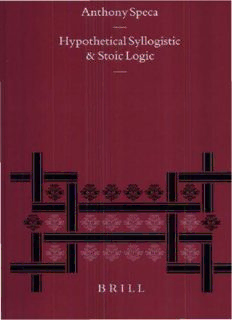
Hypothetical Syllogistic and Stoic Logic (Philosophia Antiqua 87) PDF
Preview Hypothetical Syllogistic and Stoic Logic (Philosophia Antiqua 87)
PHILOSOPHIA ANTIQUA A SERIES OF STUDIES ON ANCIENT PHILOSOPHY FOUNDED BY J.H. WASZINKt AND WJ. VERDENIUSt EDITED BY J. MANSFELD, D.T RUNIA J.C.M. VANWINDEN VOLUME LXXXVII ANTHONY SPECA HYPOTHETICAL SYLLOGISTIC AND STOIC LOGIC HYPOTHETICAL SYLLOGISTIC AND STOIC LOGIC BY ANTHONY SPECA BRILL LEIDEN ·BOSTON· KOLN 2001 This book is printed on acid-free paper. Library of Congress Cataloging-in-Publication Data Library of Congress Cataloging-in-Publication Data is also available Die Deutsche Bibliothek-CIP-Einheitsaufnalun.e Speca, Anthony: Hypothetical syllogistic and stoic logic. I by Anthony Speca. - Leiden ; Boston ; Koln : Brill, 200 I (Philosophia antiqua; Vol. 87) ISBN 90-04-12073-4 ISSN 0079-1687 ISBN 90 04 12073 4 ©Copyright 2001 by Koninklijke Brill NV, Leiden, The Netherlands All rights reserved. No part qf this publication mqv be reproduced, translated, stored in a retrieval system, or transmitted in any firm or by any means, electronic, mechanical, photocopying, recording or othenvise, without prior written permission from the publisher. Authorization to photocopy itemsfor internal or personal use is granted by Brill provided that the appropriate fees are paid directly to The Cop_vright Clearance Center, 2 22 Rosewood Drive, Suite 91 0 Danvers MA 01923, USA. Fees are subject to change. PRINTED IN THE NETHERLWDS CONTENTS Acknowledgments.......................................................................... v11 Abstrad.......................................................................................... IX Preface........................................................................................... xi 1. The Aristotelian Background.................................................. 1 2. The Greek Commentators on Aristotle.................................. 35 3. Boethius: On hypothetical syllogisms........................................... 67 4. Boethius: On Cicero 's Topics....................................................... 101 References...................................................................................... 135 General Index................................................................................ 139 Index locorum..... ..... .. .. .. ... .. . .. . .. ... . .. .. . . ........ .. .... .. ....... .. .. .... .. .. ..... .. . 141 ACKNOWLEDGMENTS This book is the culmination of doctoral research I conducted under the auspices of the Collaborative Programme in Ancient and Medieval Philosophy at the University of Toronto. For their advice and comments, I thank the members of my thesis committee: Brad Inwood, John Magee, and Calvin Normore. The remaining errors are mine. I also thank Brad Inwood particularly for his patience and help in transforming my novice Greek into a useful research tool, and John Magee for agreeing to serve as my advisor despite not knowing me or my work previously. To Calvin Normore go my thanks for our professional camaraderie, which began even when I was merely a prospective graduate student. I am also grateful to Alan Code, who has encouraged me in all my scholarly endeavors, and who undertook the external appraisal of the thesis. George Schumm helped me to enjoy logic despite my original intention never to pursue it beyond curricular require ments. Additionally, many of my fellow students have enriched my graduate years with conversation, argument, and friendship; I especially want to note Joshua Mozersky and Mark Silcox. While I was composing the thesis that became this book, I bene fitted from holding a Connaught Scholarship from the University of Toronto and an Ambassadorial Scholarship from the Rotary Foundation. The latter scholarship enabled me to spend an academic year at the University of Auckland, whose Department of Philosophy received me with hospitality. I thank each of these institutions for their aid. When I had finished my undergraduate thesis, I dedicated it to my parents for their unswerving support and love, and to Chry sippus of Soli for an idea that I had stolen from him. I dedicate this new work again to my parents, whose support and love continue unswervingly, and to Claudius Galen, upon whose discernment I have capitalized this time. Toronto, October 2000 A.N.S. ABSTRACT Aristotle recorded his intention to discuss hypothetical syllogistic fully (An. pr. 50a39), but no such treatment by him has been avail able since at least A.D. 200, if even it ever existed. The contributions of his successor Theophrastus have also perished, as have those of his followers of the subsequent few centuries. At the same time, almost all of the surviving sources, especially the Greek comment ators and Boethius, did not report hypothetical syllogistic accurate ly. Rather, they conflated it with Stoic logic, which it resembles in some respects, but from which it is significantly different. Modern scholars, who have not appreciated the nature or extent of this con flation, have unintentionally perpetuated the problem. As a result, the original form of hypothetical syllogistic has been misunder stood, and part of the influence of Stoic logic in late antiquity has remained unclear. This book is an account of the conflation of hypothetical syllo gistic and Stoic logic. The first chapter is a study of Aristotle's remarks on hypothetical syllogistic, which suggest that it was not a sentential logic such as the Stoics would develop. The second chapter details the conflation as it appears in the Greek comment aries on Aristotle, which consists principally in a confusion be tween the original Peripatetic division of hypothetical statements and syllogisms, whose criteria are semantic, and the Stoic division of complex propositions and inference schemata, whose criteria are syntactic. The third and fourth chapters focus on Boethius's On hypothetical syllogisms and On Cicero 's Topics, in which even further conflation demonstrates that hypothetical syllogistic and Stoic logic had completely ceased to retain their distinct natures by the end of antiquity.
Description: